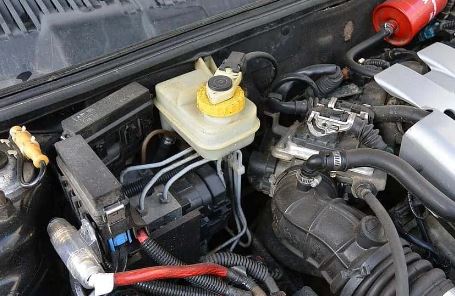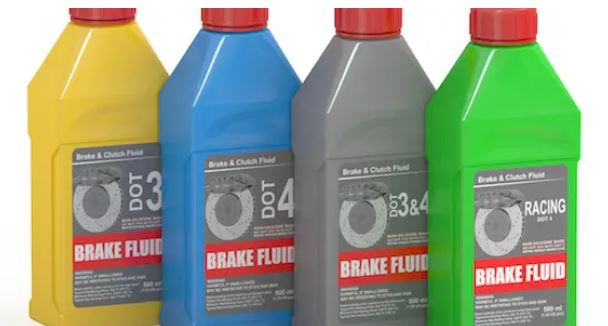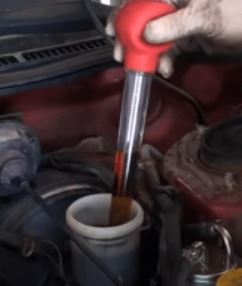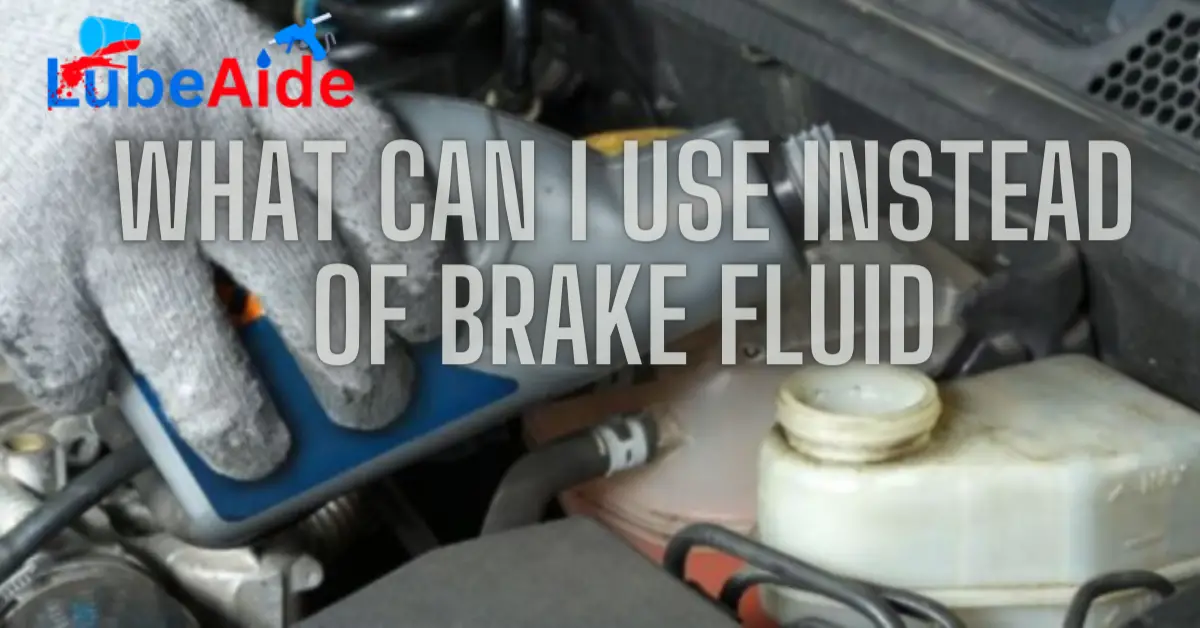When it comes to maintaining a vehicle, brake fluid is an essential component that ensures your car’s brakes function correctly. However, the conventional brake has several drawbacks, such as environmental pollution and health hazards. As a result, many vehicle owners are searching for alternative options. If you are wondering “What can I use instead of brake fluid?”, you’re not alone. Here, we will explore different fluid alternatives available in the market, their benefits, drawbacks, and factors to consider when choosing the right one for your vehicle. So, let’s dive in and explore the possibilities!
The Need for Brake Fluid Alternatives

It is a critical component in the braking system of most vehicles. It is responsible for transmitting the force from the brake pedal to the brake calipers, which in turn clamp down on the brake rotors and slow down or stop the vehicle. However, conventional fluids have certain limitations that have led to the development of alternatives.
One of the main limitations of conventional brakes is their hygroscopic nature, which means they tend to absorb moisture from the surrounding air over time. This can lead to a number of problems, such as reduced braking performance, corrosion of metal brake components, and reduced service life of the fluid itself. Furthermore, conventional fluids are typically made from glycol ethers or silicone fluids, which can be toxic and harmful to the environment if not disposed of properly.
To address these issues, researchers and manufacturers have been developing alternative fluids that offer improved performance, longer service life, and better environmental sustainability. One such alternative is a silicone-based brake, which has a higher boiling point than conventional glycol-based fluids, making it less susceptible to vaporization and brake fade. Silicone-based fluids also have a longer service life and are less hygroscopic than glycol-based fluids.
Another alternative is a water-based brake, which is made from glycol and water. Water-based fluids have a higher boiling point than conventional glycol-based fluids, making them less susceptible to vaporization and brake fade. They are also less toxic and more environmentally friendly than conventional brake fluids.
Some manufacturers are exploring the use of synthetic fluids, such as esters and glycol-free fluids, as alternatives to conventional brake. These fluids offer improved performance and longer service life, as well as better environmental sustainability.
What Can I Use Instead of Brake Fluid: Types of Alternatives

- Silicone-Based Brake Fluid: Silicone-based fluid is a popular alternative to traditional brake fluid. It is made from polydimethylsiloxane, which is a type of silicone oil. Unlike traditional fluid, the silicone-based brake is hydrophobic, which means it doesn’t absorb water. This makes it more resistant to corrosion and reduces the risk of brake failure due to water absorption. However, silicone-based brakes can be more expensive than traditional fluid and may not be compatible with all types of brake systems.
- Mineral Oil-Based Brake Fluid: Mineral oil-based is another alternative to traditional fluid. It is made from refined petroleum oil and is less toxic and more biodegradable than the traditional brake. Mineral oil-based brake is also less hygroscopic than traditional fluid, which means it doesn’t absorb water as easily. However, it is not recommended for use in vehicles with ABS (anti-lock brake systems) and may be more expensive than the traditional brake.
- Vegetable Oil-Based Brake Fluid: Vegetable oil-based is a natural and eco-friendly alternative to traditional fluid. It is made from vegetable oil and other natural ingredients and is biodegradable, non-toxic, and safer for the environment. Vegetable oil-based brake also has a higher boiling point than traditional brake fluid, which means it can withstand higher temperatures without boiling. However, it may not be as widely available as other brake fluid alternatives and may be more expensive.
- Water-Based Brake Fluid: Water-based is another alternative to traditional brake fluid. It is made from a mixture of water and glycol or glycerin, which lowers the freezing point and raises the boiling point of the mixture. Water-based brake is non-toxic, biodegradable, and more environmentally friendly than the traditional brake. However, it is more prone to corrosion and may not be suitable for vehicles with ABS or traction control systems.
- Gas-Based Brake Fluid: Gas-based is a new type of fluid that is still in the experimental stage. It is made from a mixture of gases that are compressed into a liquid. Gas-based fluid has a higher boiling point than traditional brakes and is less likely to corrode brake system components. However, it has yet to be widely available and may not be compatible with all types of brake systems.
Pros and Cons of Brake Fluid Alternatives
Pros:
- Longer Life: One of the main benefits of fluid alternatives is that they have a longer lifespan than traditional brake fluids. For example, some synthetic-based fluids claim to have a lifespan of up to 5 years, while traditional glycol-ether-based fluids need to be changed every 2 years.
- Higher Boiling Points: Brake fluid alternatives typically have higher boiling points than traditional fluids, which means they can handle higher temperatures without vaporizing. This is especially beneficial for high-performance vehicles, where the brakes can get extremely hot during hard driving.
- Less Corrosive: Some brake fluid alternatives are less corrosive than traditional brake fluids, which can help reduce the wear and tear on your braking system over time. This can also reduce the likelihood of leaks or other brake system failures.
Cons:
- Compatibility Issues: One of the main drawbacks of fluid alternatives is that they may not be compatible with all vehicles. Some fluid alternatives are only suitable for certain types of brake systems or specific vehicle models, so it’s important to check compatibility before using them.
- Higher Cost: Brake fluid alternatives are often more expensive than traditional brake fluids, which can be a deterrent for some vehicle owners.
- Limited Availability: Some fluid alternatives may not be readily available at all auto parts stores or service centers, which can make it difficult to find a suitable replacement if needed.
Choosing the Right Brake Fluid Alternative

Choosing the right fluid alternative is important for maintaining the proper function of your vehicle’s braking system. This fluid is a hydraulic fluid that is responsible for transmitting force from the brake pedal to the brake pads, which then apply pressure to the rotors to slow or stop the vehicle.
It is typically made from glycol-ether or silicone-based materials, and its properties are determined by its boiling point, viscosity, and compatibility with various materials used in the braking system. It is important to use the recommended brake for your vehicle, as using the wrong type of fluid can damage the system and compromise its performance.
There are different types of fluids available, including DOT 3, DOT 4, DOT 5, and DOT 5.1. DOT 3 and DOT 4 are glycol-based fluids commonly used in most vehicles, while DOT 5 is a silicone-based fluid used in some high-performance vehicles. DOT 5.1 is similar to DOT 3 and DOT 4, but with a higher boiling point.
If you are considering an alternative fluid, it is important to consult with a qualified mechanic or refer to your vehicle’s owner’s manual for recommendations. Some alternatives may be compatible with your vehicle’s braking system, while others may not be suitable or may require modifications to the system.
It is also important to note that using alternative fluids may void the vehicle’s warranty and could impact the vehicle’s performance and safety. Therefore, it is recommended to use the recommended fluid and follow the manufacturer’s guidelines for maintaining the braking system.
Installation and Maintenance of Alternative Brake Fluids

Alternative brake fluids are non-traditional types of brake fluids that are used as an alternative to the more common glycol-based fluids. These alternative fluids can include silicone-based fluids, mineral oil-based fluids, and even water-based fluids. While alternative fluids can offer certain advantages over traditional fluids, such as higher boiling points and greater compatibility with certain materials, they also require different installation and maintenance procedures.
Installation of alternative brake fluids typically involves flushing out the old fluid from the brake system and replacing it with the new fluid. This process may require multiple flushes to ensure that all of the old fluid has been removed. It is important to follow the manufacturer’s instructions for the specific type of alternative fluid being used, as different fluids may require different procedures. In addition, it is important to ensure that the brake system is completely free of air after the new fluid has been installed.
Maintenance of alternative fluids typically involves regular inspection of the fluid level and condition. Some types of alternative fluids may require more frequent changes than traditional fluids, so it is important to follow the manufacturer’s recommendations for maintenance intervals. In addition, it is important to avoid mixing different types of alternative fluids or using traditional fluids with alternative fluids, as this can lead to a loss of performance or damage to the brake system.
Overall, installing and maintaining alternative brake fluids require careful attention to detail and adherence to the manufacturer’s instructions. By following these guidelines, users can ensure that their brake systems operate safely and reliably.
Brake Fluid Alternatives vs Traditional Brake Fluid: A Comparative Analysis
- Composition: Traditional fluid is glycol-based and can absorb moisture over time. When moisture is absorbed, the boiling point of the fluid decreases, which can cause brake fade or failure. Brake fluids such as DOT 3 and DOT 4 are polyethylene glycol based, while DOT 5.1 is borate ester-based. In contrast, fluid alternatives like silicone-based, mineral oil-based, and synthetic-based fluids do not absorb moisture, which means their boiling points remain constant over time.
- Boiling Point: The boiling point of fluid is essential because it determines how well the fluid can perform under high temperatures. Traditional brake fluids have boiling points ranging from 401°F (DOT 3) to 518°F (DOT 5.1). Silicone-based brake fluid has a higher boiling point than traditional brake fluid, with a boiling point of 500°F. Mineral oil-based fluid has a lower boiling point than traditional fluid, with a boiling point of 365°F. Synthetic-based brake fluids have varying boiling points, depending on their composition.
- Compatibility: One crucial factor to consider when choosing brake fluid is its compatibility with the vehicle’s braking system. Traditional fluids are compatible with most vehicles, but some European manufacturers require specific fluids with particular specifications. In contrast, fluid alternatives may not be compatible with all braking systems. For example, silicone-based fluids are not compatible with ABS (anti-lock braking systems), and mineral oil-based fluids are only compatible with certain types of braking systems.
- Cost: The cost of brake fluid is another factor to consider when deciding between traditional brake fluid and its alternatives. Traditional fluids are less expensive than alternatives such as silicone-based or synthetic-based fluids.
- Environmental Impact: It is essential to consider the environmental impact of brake fluid. Traditional fluid is harmful to the environment and must be disposed of properly. Alternatives such as silicone-based, mineral oil-based, and synthetic-based fluids are more environmentally friendly and can be disposed of more safely.
FAQs About What Can I Use Instead of Brake Fluid
What is brake fluid made of?
It is typically made of glycols or borates. Traditional fluids, such as DOT 3, DOT 4, and DOT 5.1, are glycol-based. Other types of fluid, such as silicone-based, mineral oil-based, and synthetic-based fluids, use different types of compounds as their base.
Can I mix different types of brake fluid?
No, it is not recommended to mix different types of brake fluid. Each type of fluid has a unique chemical composition and mixing them can result in unpredictable performance and potentially damage your braking system. Stick to using the type of fluid specified by your vehicle manufacturer.
How often should I change my brake fluid?
It is generally recommended to change your brake fluid every 2 years or 24,000 miles, whichever comes first. However, this can vary depending on your vehicle’s make and model, driving conditions, and other factors. Check your vehicle owner’s manual or consult with a mechanic to determine the appropriate fluid change interval for your vehicle.
Can I use brake fluid that has been opened for a long time?
No, it is not recommended to use brake fluid that has been opened for a long time. Brake fluid can absorb moisture over time, which can reduce its boiling point and cause brake fade or failure. If you have fluid that has been opened for more than a year, it is best to dispose of it properly and use fresh fluid.
Can I use vegetable oil as brake fluid?
No, vegetable oil cannot be used as brake fluid. Brake fluid is a specialized fluid with unique chemical properties that are designed to perform in extreme conditions, such as high temperatures and pressure. Vegetable oil does not have these properties and cannot function as a fluid. Using vegetable oil as fluid can result in brake failure and potentially cause a serious accident.
Final Thought
In the end, brake fluid is an essential component of your vehicle’s braking system, and it is crucial to choose the right type of fluid and replace it regularly. What can I use instead of brake fluid? such as silicone-based, mineral oil-based, and synthetic-based fluids, it is not recommended to mix different types of fluid or use fluid that has been opened for a long time. It is also important to note that vegetable oil cannot be used as a substitute for fluid. In summary, choosing the right brake fluid for your vehicle and following the manufacturer’s recommendations for replacement intervals is crucial for ensuring the safety and reliability of your braking system.
Related Topics:
- What Can I Use Instead of Brake Fluid
- brake fluid low but no leak
- How Long Can You Drive Without Brake Fluid
- No Brake Fluid to One Wheel
- can you add brake fluid while car is hot
- Brake Fluid Leaking from Caliper Bolt
- what happens when brake fluid is low
- When to Flush Brake Fluid
- Does Brake Fluid Leak When Car is Off
- How to Dispose of Brake Fluid


